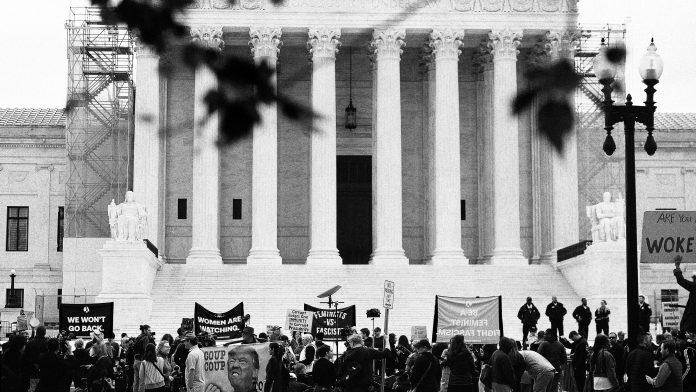Here are a few things that Donald Trump’s lawyer says a president ought to be immune from prosecution for doing:
- selling nuclear secrets
- employing the U.S. military to assassinate a political rival
- launching a coup
During a Supreme Court hearing this morning, John Sauer, representing the former president, argued that each of these actions could be understood as an “official act” of the president, and that no current or former president may be charged with crimes for doing them.
These are shocking arguments, no less so for the fact that Sauer was already asked about the assassination during arguments at an appeals court and took the same position. And they clarify that in the case before the justices—whether Trump can be federally prosecuted for his attempt to steal the 2020 presidential election—immunity really means something very dangerous: impunity.
“Without immunity from criminal prosecution, there can be no presidency as we know it,” Sauer said at the outset of arguments. Sauer repeatedly complained that no president had faced a criminal prosecution before Trump, an argument that seemed to find favor among conservative justices. But one explanation for this is that no prior president has ever tried to remain in office after losing an election. An alternative way to frame the argument, as the Justice Department lawyer Michael Dreeben noted, was whether the rule of law applies to the president. That’s an important backward-looking question, with regard to Trump’s attempted coup, but also an important one for future administrations, especially if Trump wins back office in the 2024 election.
The justices appeared reluctant to accept the argument quite as broadly as Sauer made it. For example, Trump’s lawyers have argued that a former president could face charges only after first being impeached and convicted. Justice Amy Coney Barrett was perplexed: How can a president be both absolutely immune and also prosecutable after impeachment?
[Read: Trump’s presidential-immunity theory is a threat to the chain of command]
Some of the Court’s liberals, notably Justices Sonia Sotomayor and Ketanji Brown Jackson, seemed content to agree with the appeals court that a president is simply not criminally immune. Jackson conceded that the president faces special pressures, but noted that so do many other people who do their jobs with the possibility of indictment if they break the law. Why should the president be different?
But the Court’s more conservative members appeared more willing to accept that some of the president’s actions—the “official” ones—ought to be beyond prosecution. That wouldn’t settle the matter, though; if the Court does conclude that a president enjoys criminal immunity for official acts, then the question becomes what Justice Clarence Thomas asked near the very outset of the hearing: “How would we determine what an official act is?” The argument did not provide a clear answer or a clear indication of how the justices might answer.
Sotomayor asked if acts done for personal gain could still qualify as official acts. Sauer said yes, to Sotomayor’s chagrin. “You’re asking us to say a president is entitled, not to make a mistake, but is entitled for total personal gain to use the trappings of his office—that’s what you’re trying to get us to hold—without facing criminal liability,” Sotomayor said. Justice Elena Kagan asked about some of the particular acts alleged in Special Counsel Jack Smith’s indictment. Was calling the chairwoman of the Republican National Committee and asking her to establish slates of false electors an official act? Sauer said yes—even though, as Kagan noted, he could have done that just the same as a candidate who was not in office.
What about calling state officials to try to interfere with their election processes? Once again Sauer said yes, stating that it was within the president’s official duties to try to defend the integrity of a state election. This is, of course, a complete inversion of what Trump actually did after the election, which was seeking to corrupt state elections.
That was not the only moment in which the hearing went through the looking glass. Justice Samuel Alito fretted that if former presidents do not enjoy immunity, they could face the danger of prosecution by their successors, which would pose a challenge to the stability of the republic. In short, Alito was arguing that if Trump is prosecuted for a direct assault on American democracy, it might result in indirect damage to American democracy later on.
It seems unlikely that so sweeping a view will carry the day, but if the justices rule that presidents are immune in some cases, they must come up with a heuristic for deciding which ones. Courts would also need to resolve whether Smith’s team can bring forward evidence that stems from official actions, if those official actions are part of a criminal case against Trump for personal actions.
These deep divisions and tough questions suggest that the justices could take some time to rule. And that is why, in a sense, Trump has already won the case. He won by persuading the Supreme Court to even hear the matter, and he wins even bigger if they must take weeks to hammer out a decision—not to mention that the decision itself could then create the potential for further rounds of litigation. Each of those delays makes it less likely that Trump will face a trial before the election. If he wins the election, he will have the power to end the federal cases against him—rendering any questions about immunity even more academic than the discussion in Court today.

















